
carla
Open-source simulator for autonomous driving research.
Stars: 12983
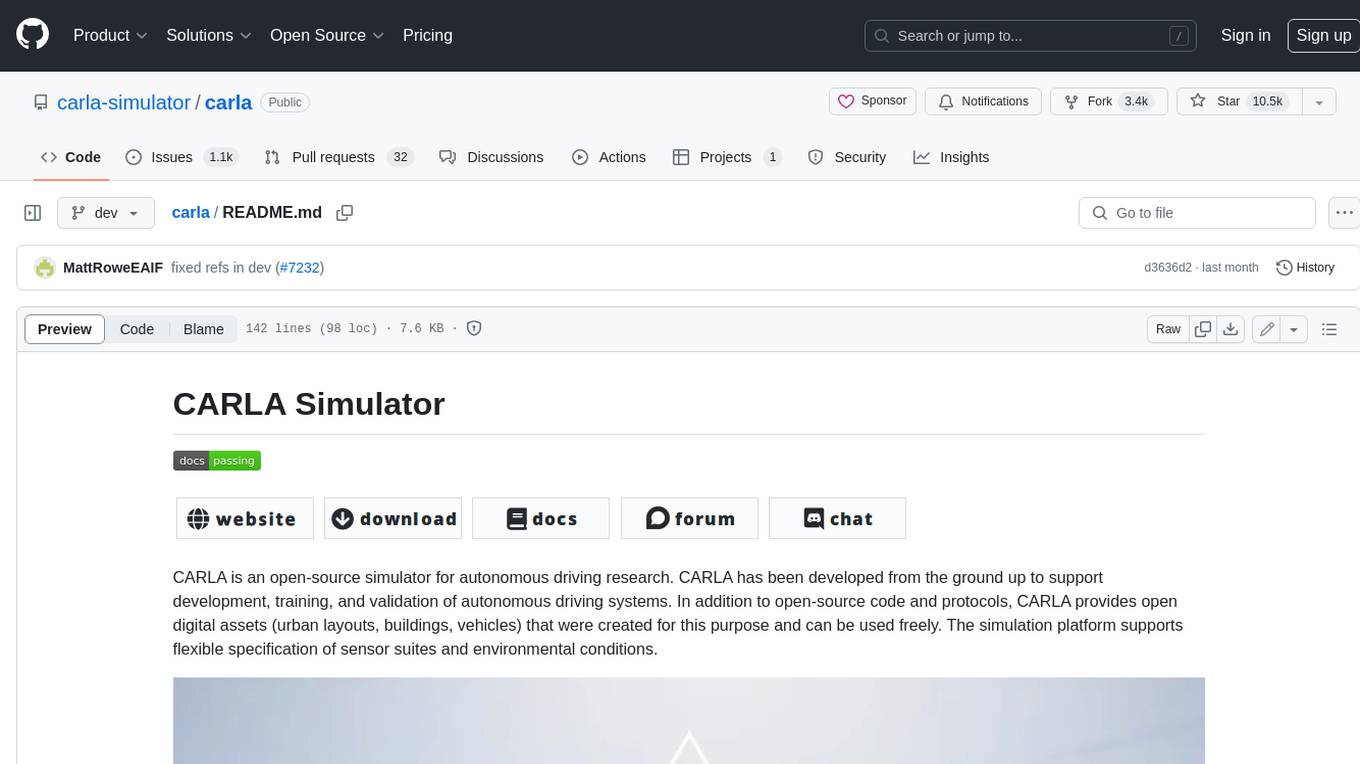
CARLA is an open-source simulator for autonomous driving research. It provides open-source code, protocols, and digital assets (urban layouts, buildings, vehicles) for developing, training, and validating autonomous driving systems. CARLA supports flexible specification of sensor suites and environmental conditions.
README:
CARLA is an open-source simulator for autonomous driving research. CARLA has been developed from the ground up to support development, training, and validation of autonomous driving systems. In addition to open-source code and protocols, CARLA provides open digital assets (urban layouts, buildings, vehicles) that were created for this purpose and can be used freely. The simulation platform supports flexible specification of sensor suites and environmental conditions.
[!NOTE] This is the development branch
ue5-devfor the Unreal Engine 5.5 version of CARLA. This branch exists in parallel with the Unreal Engine 4.26 version of CARLA, in theue4-devbranch. Please be sure that this version of CARLA is suitable for your needs as there are significant differences between the UE 5.5 and UE 4.26 versions of CARLA.
- Intel i7 gen 9th - 11th / Intel i9 gen 9th - 11th / AMD Ryzen 7 / AMD Ryzen 9
- +32 Gb RAM memory
- NVIDIA RTX 3070/3080/3090 / NVIDIA RTX 4090 or better
- 16 Gb or more VRAM
- Ubuntu 22.04 or Windows 11
[!NOTE] Ubuntu version 22.04 and Windows version 11 are required, the Unreal Engine 5.5 version of CARLA will not work on Ubuntu 20.04 or Windows 10 or lower.
The CARLA documentation is hosted on ReadTheDocs. Please see the following key links:
- Building on Linux
- Building on Windows
- First steps
- CARLA asset catalogue
- Python API reference
- Blueprint library
Repositories associated with the CARLA simulation platform:
- CARLA Autonomous Driving leaderboard: Automatic platform to validate Autonomous Driving stacks
- Scenario_Runner: Engine to execute traffic scenarios in CARLA 0.9.X
- ROS-bridge: Interface to connect CARLA 0.9.X to ROS
- Driving-benchmarks: Benchmark tools for Autonomous Driving tasks
- Conditional Imitation-Learning: Training and testing Conditional Imitation Learning models in CARLA
- AutoWare AV stack: Bridge to connect AutoWare AV stack to CARLA
- Reinforcement-Learning: Code for running Conditional Reinforcement Learning models in CARLA
- RoadRunner: MATLAB GUI based application to create road networks in OpenDrive format
- Map Editor: Standalone GUI application to enhance RoadRunner maps with traffic lights and traffic signs information
Like what you see? Star us on GitHub to support the project!
If you use CARLA, please cite our CoRL’17 paper.
CARLA: An Open Urban Driving Simulator
Alexey Dosovitskiy, German Ros,
Felipe Codevilla, Antonio Lopez, Vladlen Koltun; PMLR 78:1-16
[PDF]
[talk]
@inproceedings{Dosovitskiy17,
title = {{CARLA}: {An} Open Urban Driving Simulator},
author = {Alexey Dosovitskiy and German Ros and Felipe Codevilla and Antonio Lopez and Vladlen Koltun},
booktitle = {Proceedings of the 1st Annual Conference on Robot Learning},
pages = {1--16},
year = {2017}
}
Clone this repository locally from GitHub, specifying the ue5-dev branch:
git clone -b ue5-dev https://github.com/carla-simulator/carla.git CarlaUE5In order to build CARLA, you need acces to the CARLA fork of Unreal Engine 5.5. In order to access this repository, you must first link your GitHub account to Epic Games by following this guide. You then also need to use your git credentials to authorise the download of the Unreal Engine 5.5 repository.
Building in Linux:
Run the setup script from a terminal open in the CARLA root directory:
cd CarlaUE5
./CarlaSetup.sh --interactiveThe setup script will prompt you for your sudo password, in order to install the prerequisites. It will then prompt you for your GitHub credentials in order to authorise the download of the Unreal Engine repository.
The setup script will install by default Python 3 using apt. If you want to target an existing Python installation, you should use the --python-root=PATH_TO_PYTHON argument with the relevant Python installation path. You can use whereis python3 in your chosen environment and strip the /python3 suffix from the path.
Building in Linux unattended:
If you want to run the setup script unattended, your git credentials need to be stored in an environment variable. Add your github credentials to your .bashrc file:
export GIT_LOCAL_CREDENTIALS=username@github_tokenThen run the setup script using the following command:
cd CarlaUE5
sudo -E ./CarlaSetup.shThis will download and install Unreal Engine 5.5, install the prerequisites and build CARLA. It may take some time to complete and use a significant amount of disk space.
If you prefer to add the git credentials in the terminal, use the following command:
cd CarlaUE5
sudo -E env GIT_LOCAL_CREDENTIALS=github_username@github_token ./CarlaSetup.sh Building in Windows:
To build in Windows, run the batch script:
cd CarlaUE5
CarlaSetup.batUnattended mode is currently unavailable in Windows, you will need to enter GitHub credentials or administrator privileges when prompted.
Once the setup is complete, you can execute subsequent builds with the following commands in a terminal open in the CARLA root directory. In Linux, run these commands in a standard terminal. In Windows, open the x64 Native Tools Command Prompt for Visual Studio 2022.
Configure:
Linux:
cmake -G Ninja -S . -B Build --toolchain=$PWD/CMake/Toolchain.cmake -DCMAKE_BUILD_TYPE=Release -DENABLE_ROS2=ONWindows:
cmake -G Ninja -S . -B Build --toolchain=$PWD/CMake/Toolchain.cmake -DCMAKE_BUILD_TYPE=Release[!NOTE] If you intend to target a specific Python installation, you should add both these arguments to the above cmake command:
-DPython_ROOT_DIR=PATHand-DPython3_ROOT_DIR=PATH.
Build:
Linux and Windows:
cmake --build BuildBuild and install the Python API:
Linux and windows:
cmake --build Build --target carla-python-api-installLaunch the editor:
cmake --build Build --target launchFor more instructions on building CARLA UE5, please consult the build documentation for Linux or Windows.
Please take a look at our Contribution guidelines.
CARLA specific code is distributed under the MIT License.
CARLA specific assets are distributed under the CC-BY License.
Unreal Engine 5 follows its own license terms.
CARLA uses some dependencies related to 3rd party integrations:
- PROJ, a generic coordinate transformation software which uses the X/MIT open source license.
- SQLite, part of the PROJ dependencies, which is in the public domain.
- Xerces-C, a validating XML parser, which is made available under the Apache Software License, Version 2.0.
- Eigen, a C++ template library for linear algebra which uses the MPL2 license.
CARLA uses the Autodesk FBX SDK for converting FBX to OBJ in the import process of maps. This step is optional, and the SDK is located here
This software contains Autodesk® FBX® code developed by Autodesk, Inc. Copyright 2020 Autodesk, Inc. All rights, reserved. Such code is provided "as is" and Autodesk, Inc. disclaims any and all warranties, whether express or implied, including without limitation the implied warranties of merchantability, fitness for a particular purpose or non-infringement of third party rights. In no event shall Autodesk, Inc. be liable for any direct, indirect, incidental, special, exemplary, or consequential damages (including, but not limited to, procurement of substitute goods or services; loss of use, data, or profits; or business interruption) however caused and on any theory of liability, whether in contract, strict liability, or tort (including negligence or otherwise) arising in any way out of such code."
For Tasks:
Click tags to check more tools for each tasksFor Jobs:
Alternative AI tools for carla
Similar Open Source Tools

carla
CARLA is an open-source simulator for autonomous driving research. It provides open-source code, protocols, and digital assets (urban layouts, buildings, vehicles) for developing, training, and validating autonomous driving systems. CARLA supports flexible specification of sensor suites and environmental conditions.

deeppowers
Deeppowers is a powerful Python library for deep learning applications. It provides a wide range of tools and utilities to simplify the process of building and training deep neural networks. With Deeppowers, users can easily create complex neural network architectures, perform efficient training and optimization, and deploy models for various tasks. The library is designed to be user-friendly and flexible, making it suitable for both beginners and experienced deep learning practitioners.
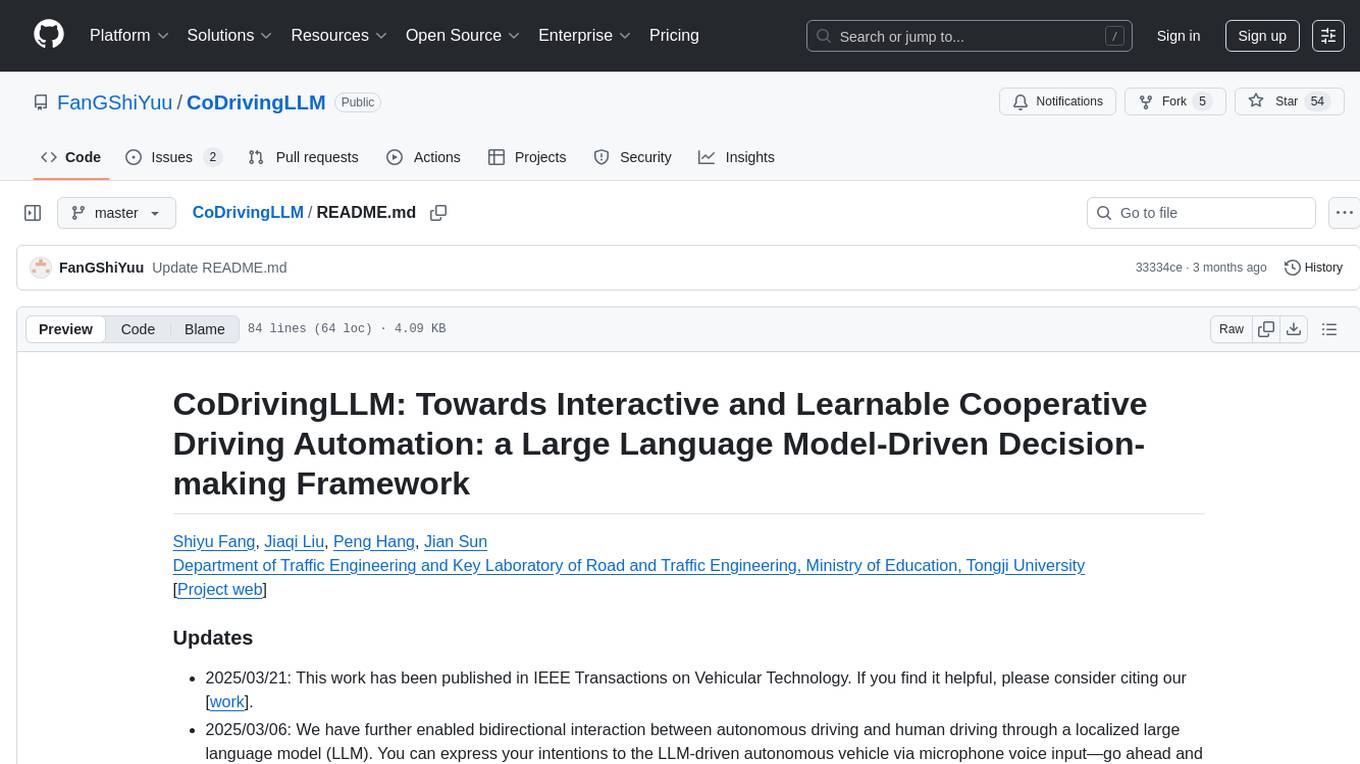
CoDrivingLLM
CoDrivingLLM is a machine learning model for predicting driving behavior based on sensor data collected from vehicles. It utilizes a Long Short-Term Memory (LSTM) neural network to analyze patterns in the data and make predictions about future driving actions. The model is trained on a large dataset of driving scenarios and can be used to improve driver assistance systems, enhance road safety, and optimize vehicle performance. CoDrivingLLM is designed to be easily integrated into existing automotive systems and can provide real-time feedback to drivers to help them make safer and more efficient driving decisions.
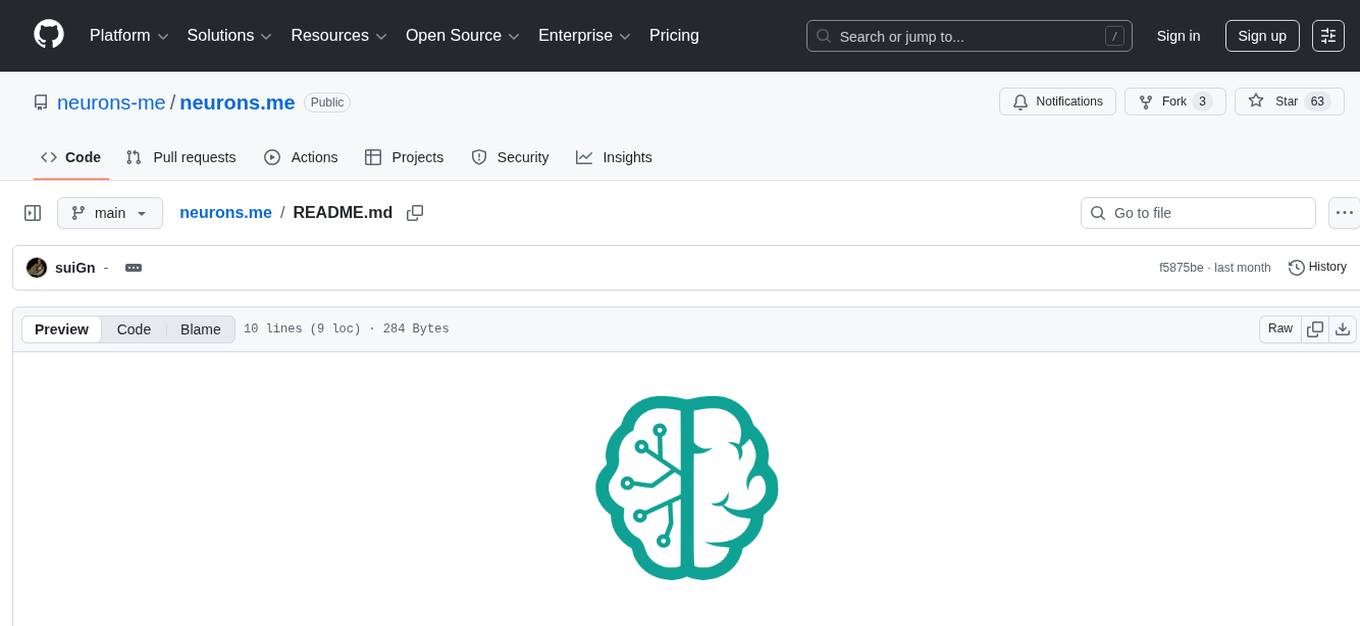
neurons.me
Neurons.me is an open-source tool designed for creating and managing neural network models. It provides a user-friendly interface for building, training, and deploying deep learning models. With Neurons.me, users can easily experiment with different architectures, hyperparameters, and datasets to optimize their neural networks for various tasks. The tool simplifies the process of developing AI applications by abstracting away the complexities of model implementation and training.
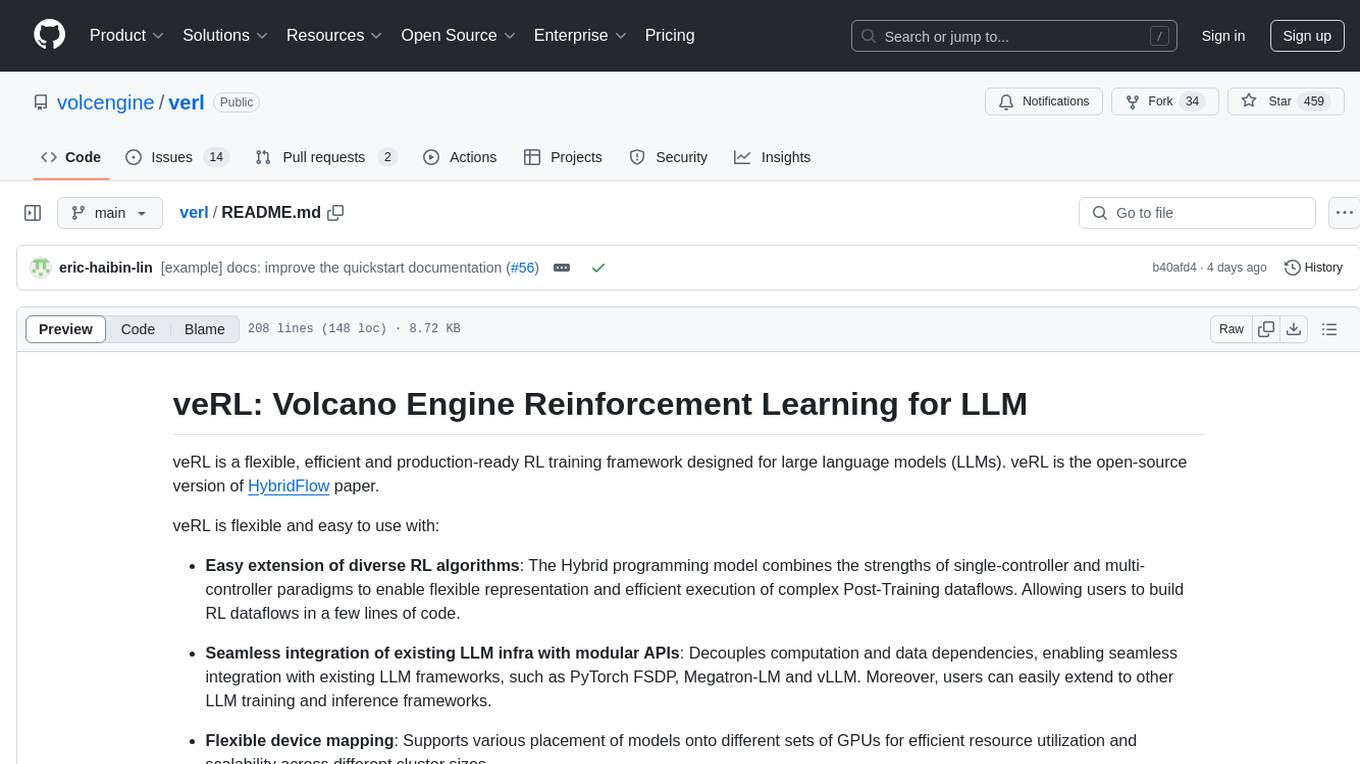
verl
veRL is a flexible and efficient reinforcement learning training framework designed for large language models (LLMs). It allows easy extension of diverse RL algorithms, seamless integration with existing LLM infrastructures, and flexible device mapping. The framework achieves state-of-the-art throughput and efficient actor model resharding with 3D-HybridEngine. It supports popular HuggingFace models and is suitable for users working with PyTorch FSDP, Megatron-LM, and vLLM backends.
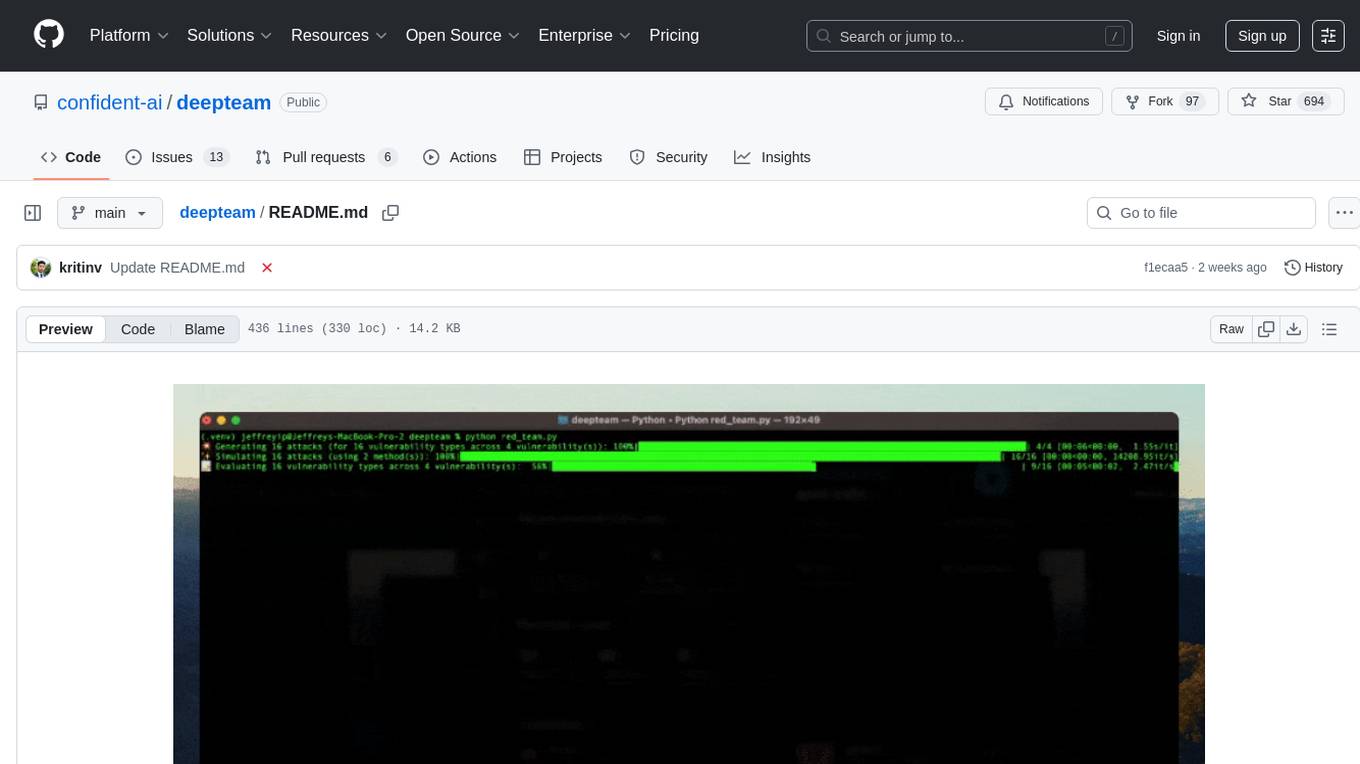
deepteam
Deepteam is a powerful open-source tool designed for deep learning projects. It provides a user-friendly interface for training, testing, and deploying deep neural networks. With Deepteam, users can easily create and manage complex models, visualize training progress, and optimize hyperparameters. The tool supports various deep learning frameworks and allows seamless integration with popular libraries like TensorFlow and PyTorch. Whether you are a beginner or an experienced deep learning practitioner, Deepteam simplifies the development process and accelerates model deployment.
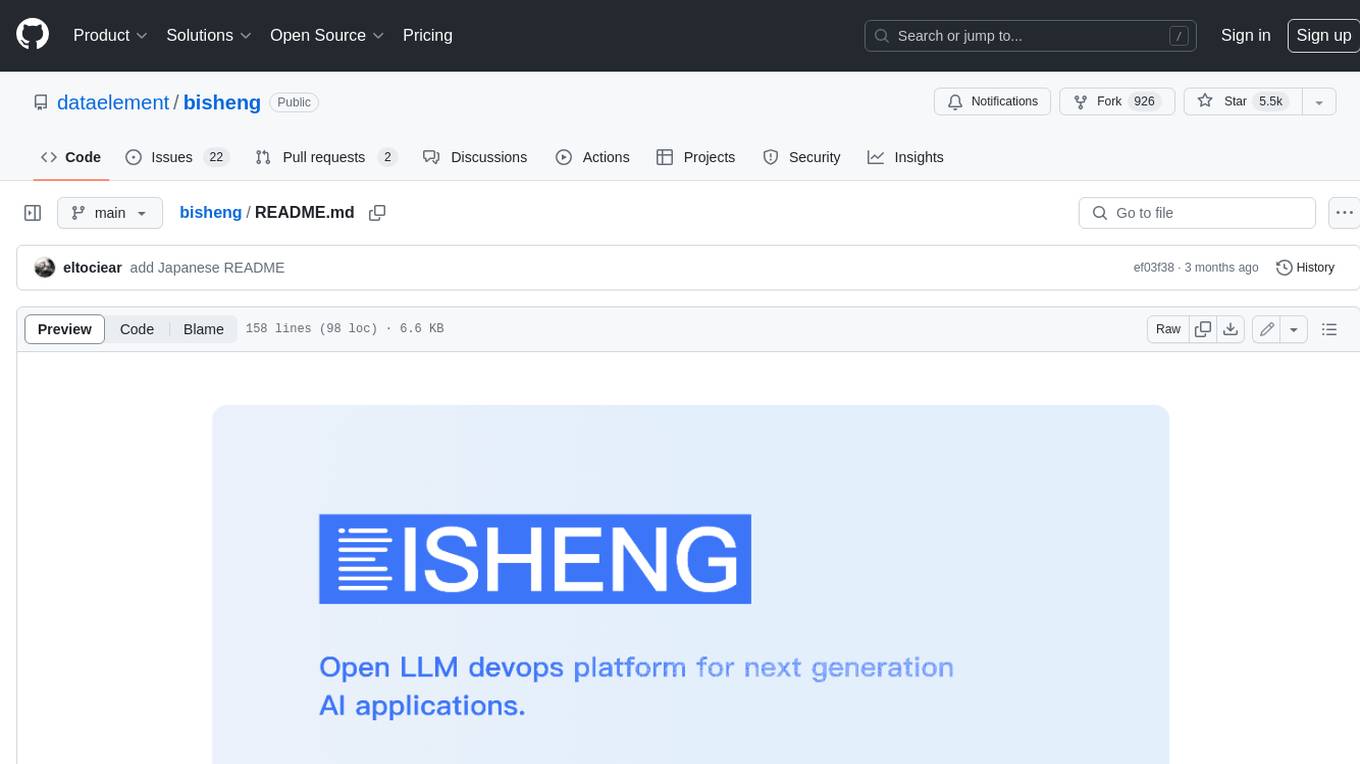
bisheng
Bisheng is a leading open-source **large model application development platform** that empowers and accelerates the development and deployment of large model applications, helping users enter the next generation of application development with the best possible experience.
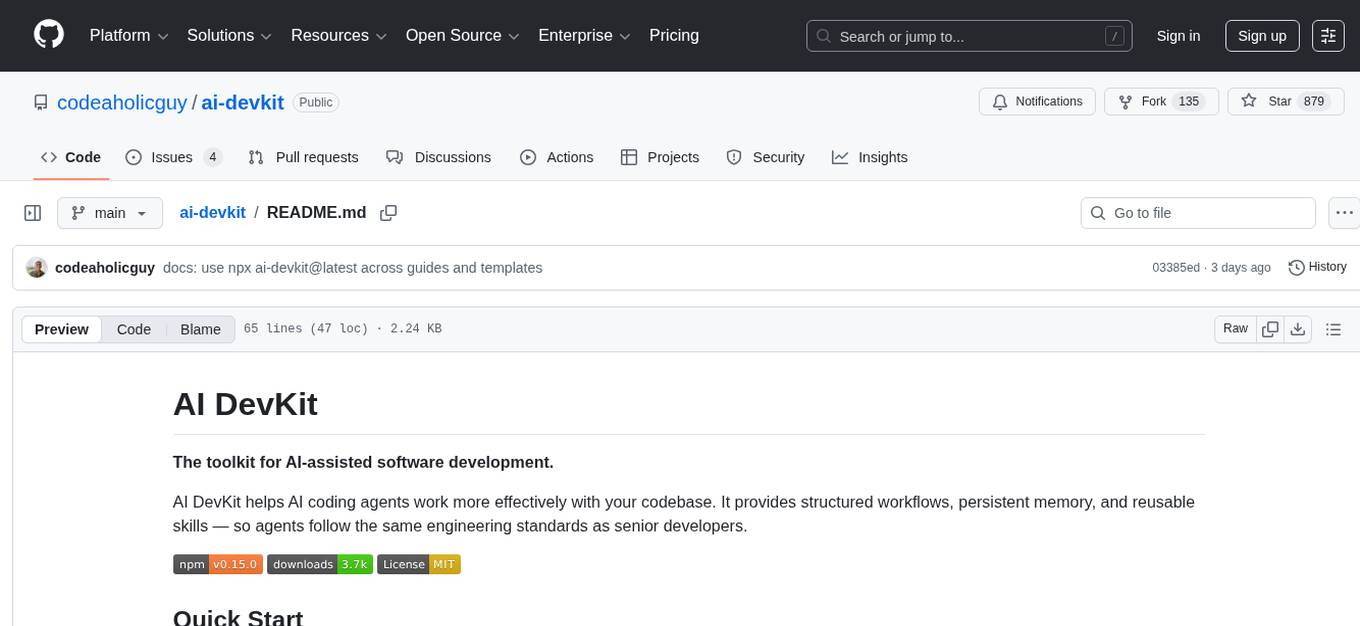
ai-devkit
The ai-devkit repository is a comprehensive toolkit for developing and deploying artificial intelligence models. It provides a wide range of tools and resources to streamline the AI development process, including pre-trained models, data processing utilities, and deployment scripts. With a focus on simplicity and efficiency, ai-devkit aims to empower developers to quickly build and deploy AI solutions across various domains and applications.
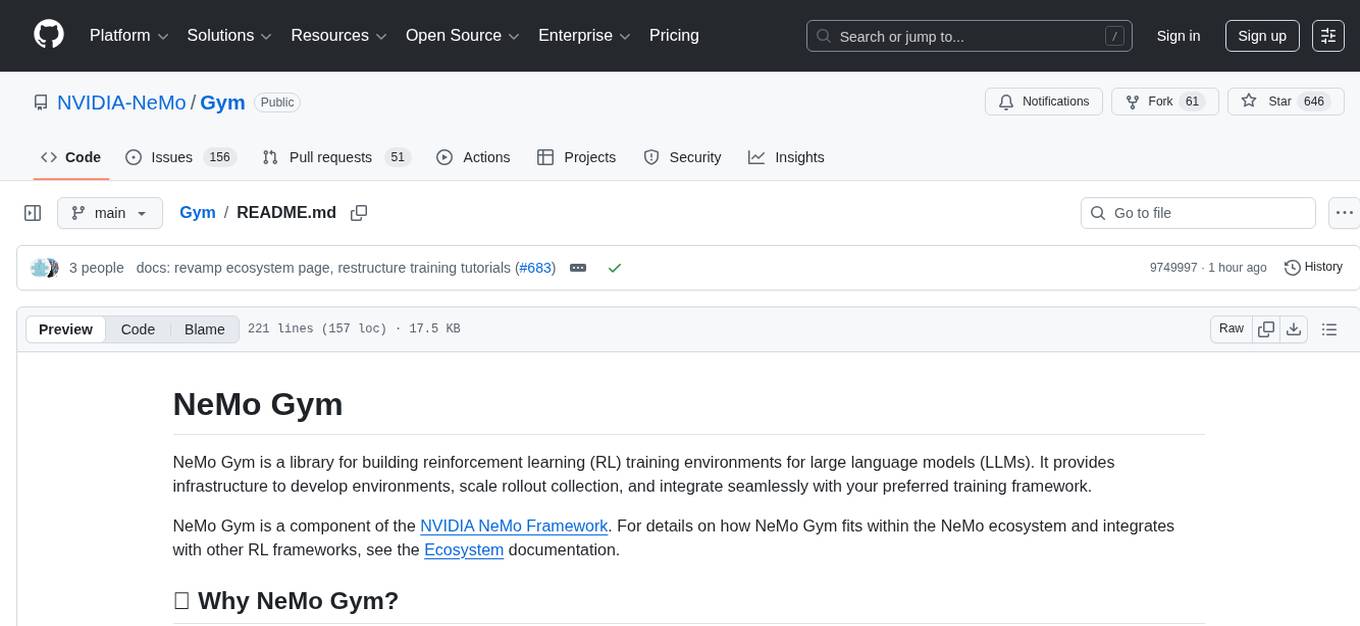
Gym
Gym is a toolkit for developing and comparing reinforcement learning algorithms. It provides a wide variety of environments ranging from simple grid worlds to complex 3D environments, allowing researchers to easily test and benchmark their algorithms. With a user-friendly interface and extensive documentation, Gym is suitable for both beginners and experts in the field of reinforcement learning.
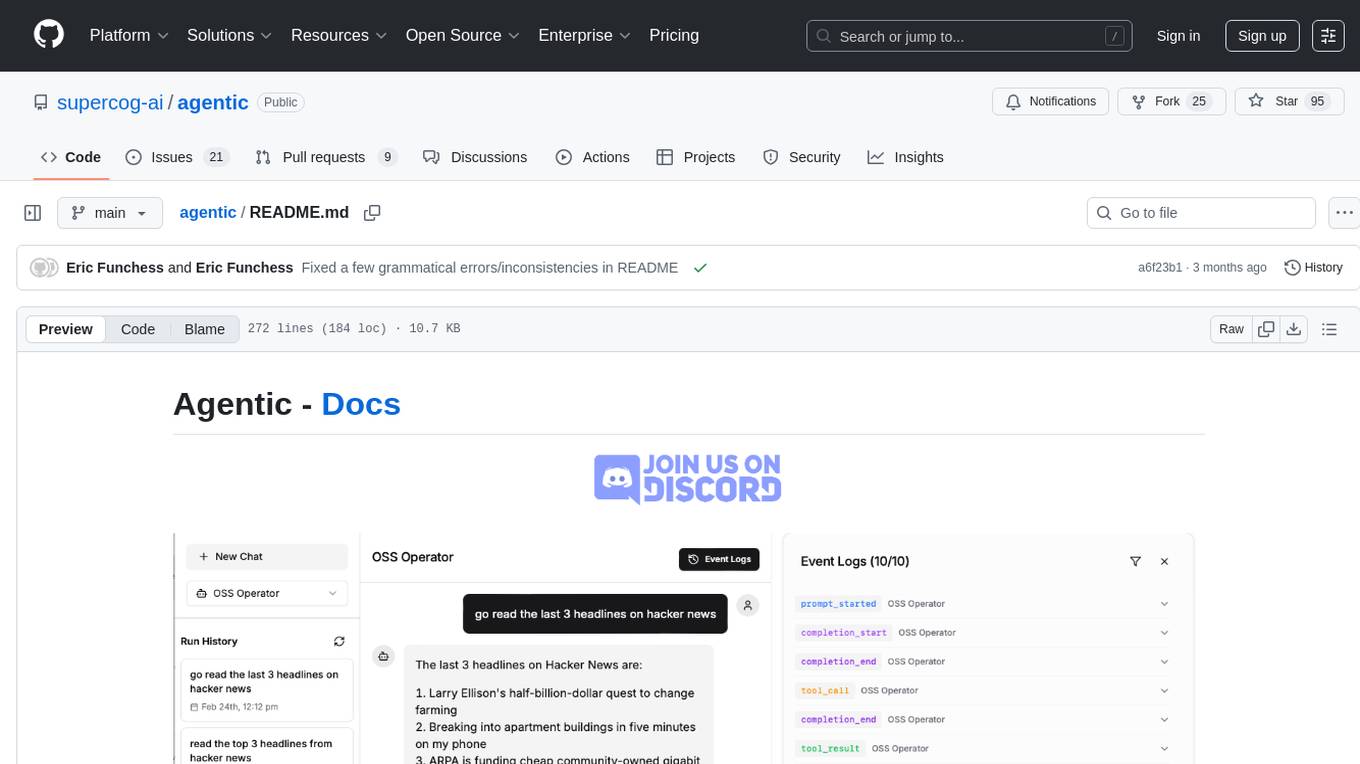
agentic
Agentic is a lightweight and flexible Python library for building multi-agent systems. It provides a simple and intuitive API for creating and managing agents, defining their behaviors, and simulating interactions in a multi-agent environment. With Agentic, users can easily design and implement complex agent-based models to study emergent behaviors, social dynamics, and decentralized decision-making processes. The library supports various agent architectures, communication protocols, and simulation scenarios, making it suitable for a wide range of research and educational applications in the fields of artificial intelligence, machine learning, social sciences, and robotics.
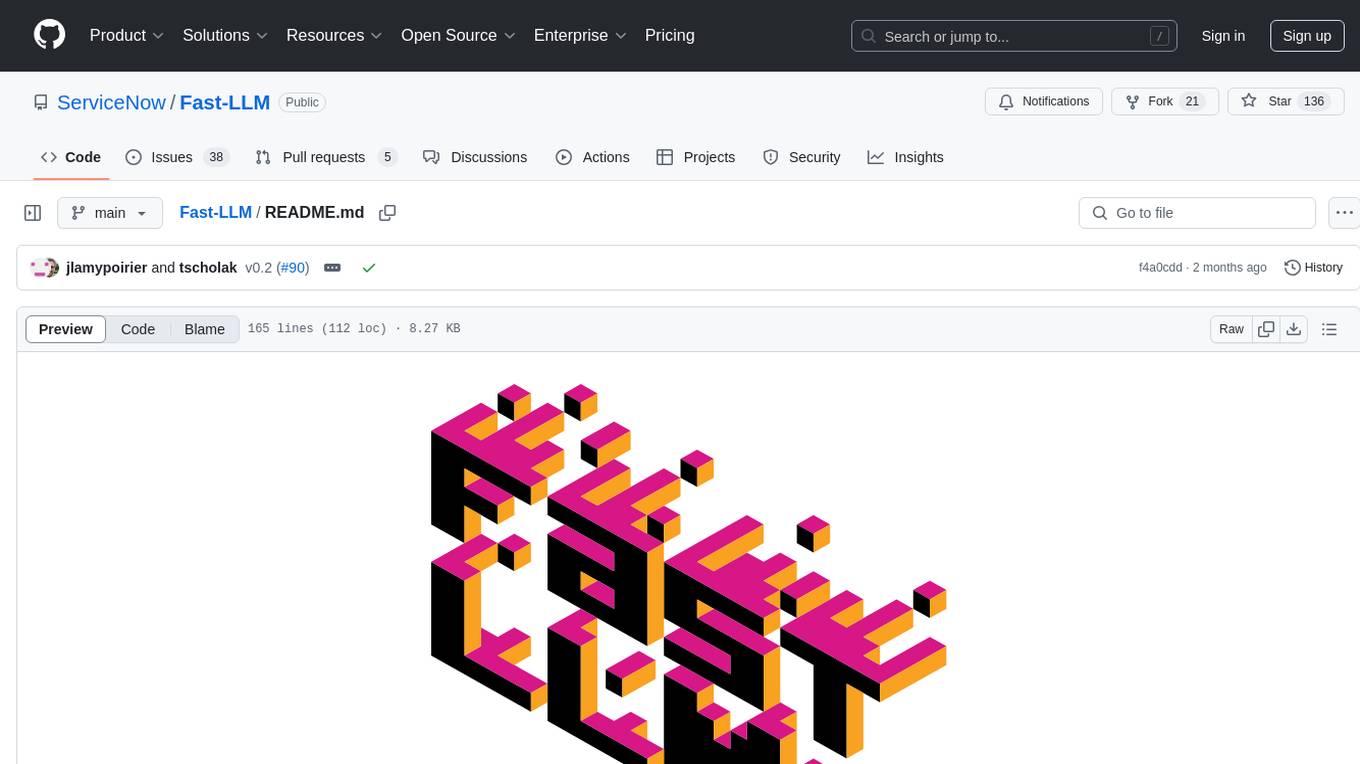
Fast-LLM
Fast-LLM is an open-source library designed for training large language models with exceptional speed, scalability, and flexibility. Built on PyTorch and Triton, it offers optimized kernel efficiency, reduced overheads, and memory usage, making it suitable for training models of all sizes. The library supports distributed training across multiple GPUs and nodes, offers flexibility in model architectures, and is easy to use with pre-built Docker images and simple configuration. Fast-LLM is licensed under Apache 2.0, developed transparently on GitHub, and encourages contributions and collaboration from the community.
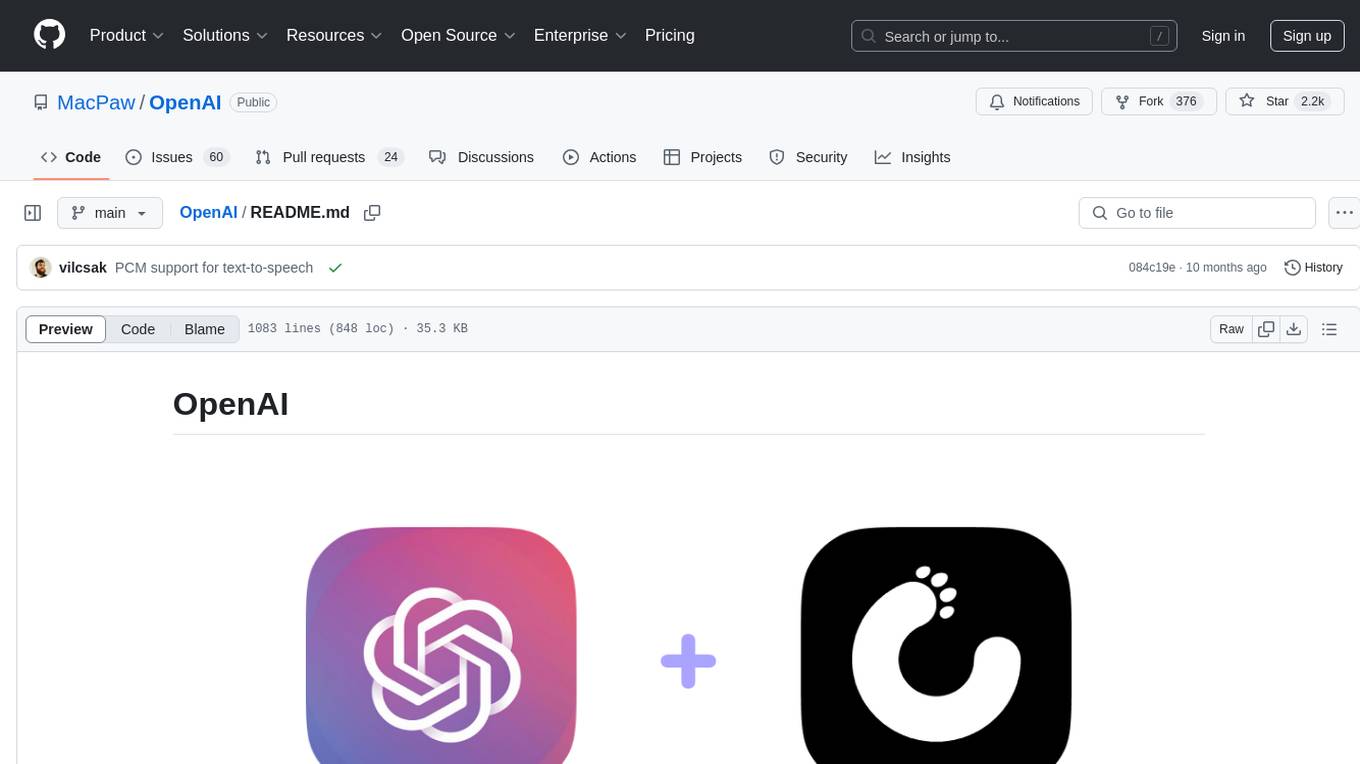
OpenAI
OpenAI is a Swift community-maintained implementation over OpenAI public API. It is a non-profit artificial intelligence research organization founded in San Francisco, California in 2015. OpenAI's mission is to ensure safe and responsible use of AI for civic good, economic growth, and other public benefits. The repository provides functionalities for text completions, chats, image generation, audio processing, edits, embeddings, models, moderations, utilities, and Combine extensions.
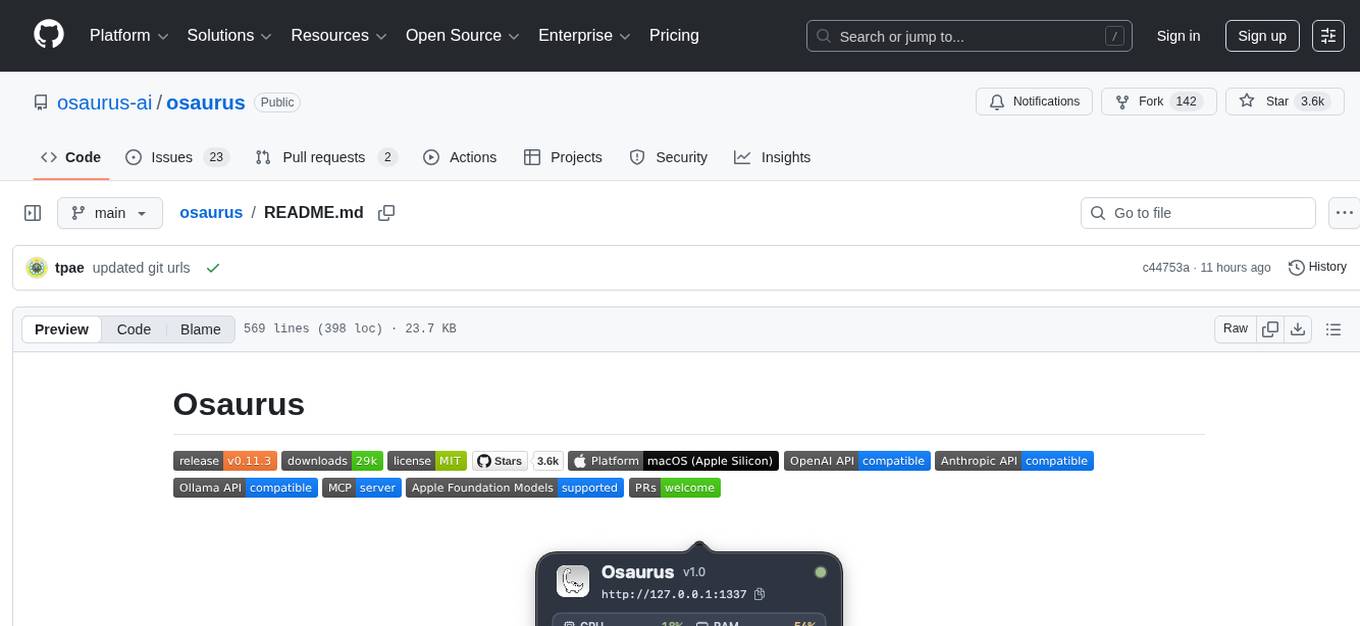
osaurus
Osaurus is a versatile open-source tool designed for data scientists and machine learning engineers. It provides a wide range of functionalities for data preprocessing, feature engineering, model training, and evaluation. With Osaurus, users can easily clean and transform raw data, extract relevant features, build and tune machine learning models, and analyze model performance. The tool supports various machine learning algorithms and techniques, making it suitable for both beginners and experienced practitioners in the field. Osaurus is actively maintained and updated to incorporate the latest advancements in the machine learning domain, ensuring users have access to state-of-the-art tools and methodologies for their projects.
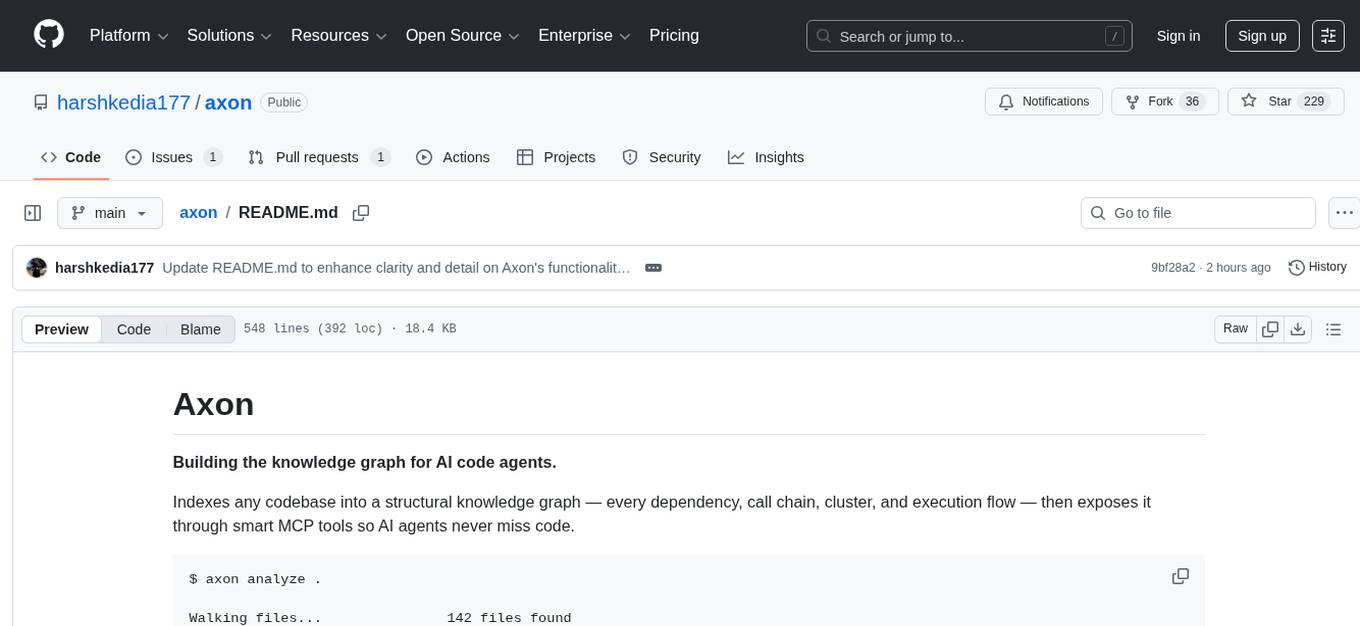
axon
Axon is a powerful neural network library for Python that provides a simple and flexible way to build, train, and deploy deep learning models. It offers a wide range of neural network architectures, optimization algorithms, and evaluation metrics to support various machine learning tasks. With Axon, users can easily create complex neural networks, train them on large datasets, and deploy them in production environments. The library is designed to be user-friendly and efficient, making it suitable for both beginners and experienced deep learning practitioners.
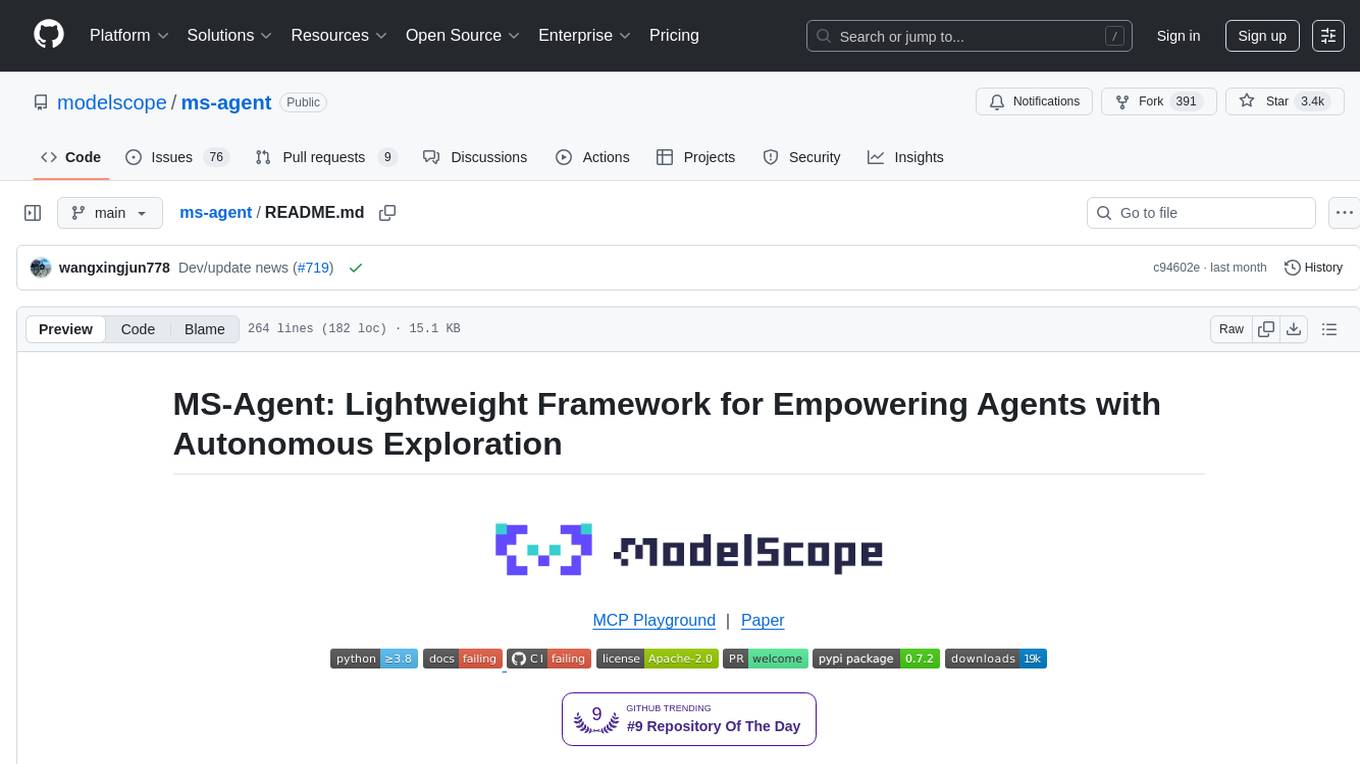
ms-agent
MS-Agent is a lightweight framework designed to empower agents with autonomous exploration capabilities. It provides a flexible and extensible architecture for creating agents capable of tasks like code generation, data analysis, and tool calling with MCP support. The framework supports multi-agent interactions, deep research, code generation, and is lightweight and extensible for various applications.
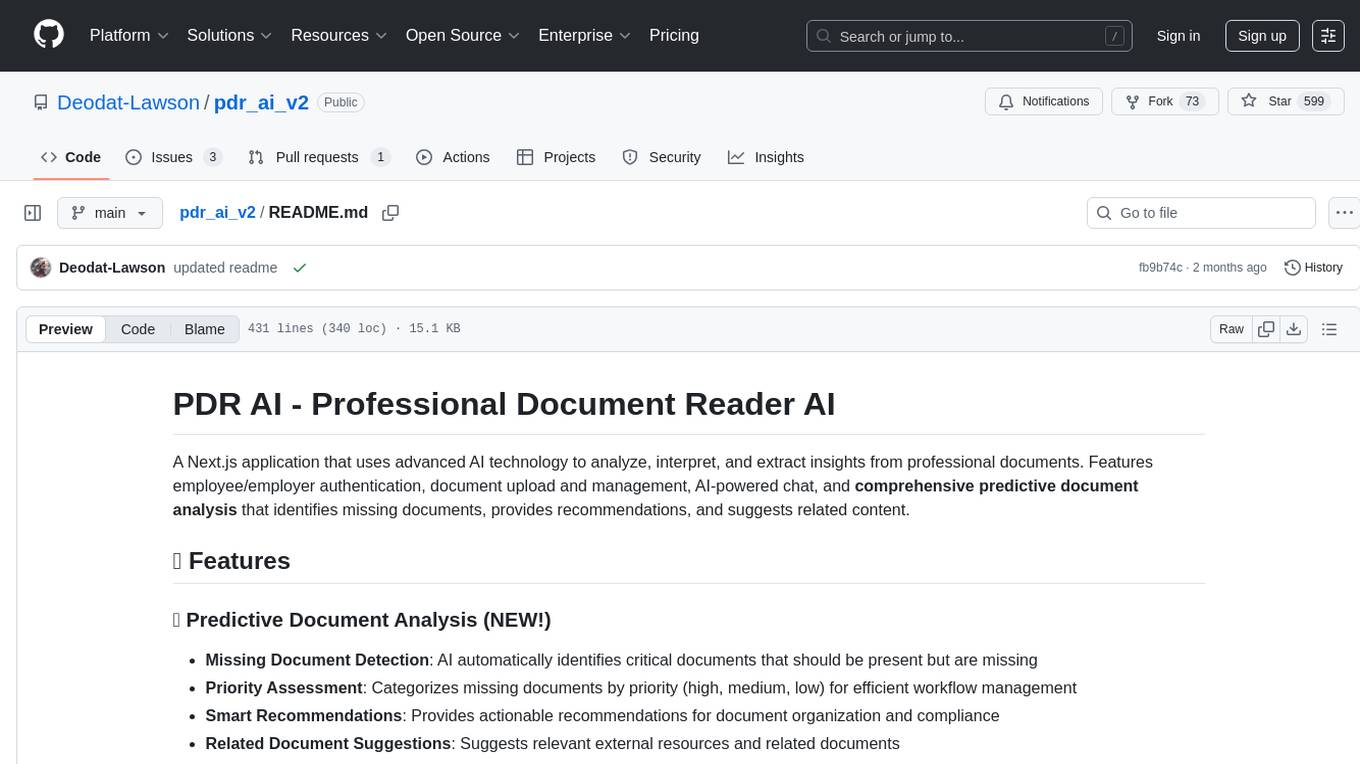
pdr_ai_v2
pdr_ai_v2 is a Python library for implementing machine learning algorithms and models. It provides a wide range of tools and functionalities for data preprocessing, model training, evaluation, and deployment. The library is designed to be user-friendly and efficient, making it suitable for both beginners and experienced data scientists. With pdr_ai_v2, users can easily build and deploy machine learning models for various applications, such as classification, regression, clustering, and more.
For similar tasks

carla
CARLA is an open-source simulator for autonomous driving research. It provides open-source code, protocols, and digital assets (urban layouts, buildings, vehicles) for developing, training, and validating autonomous driving systems. CARLA supports flexible specification of sensor suites and environmental conditions.
For similar jobs

carla
CARLA is an open-source simulator for autonomous driving research. It provides open-source code, protocols, and digital assets (urban layouts, buildings, vehicles) for developing, training, and validating autonomous driving systems. CARLA supports flexible specification of sensor suites and environmental conditions.
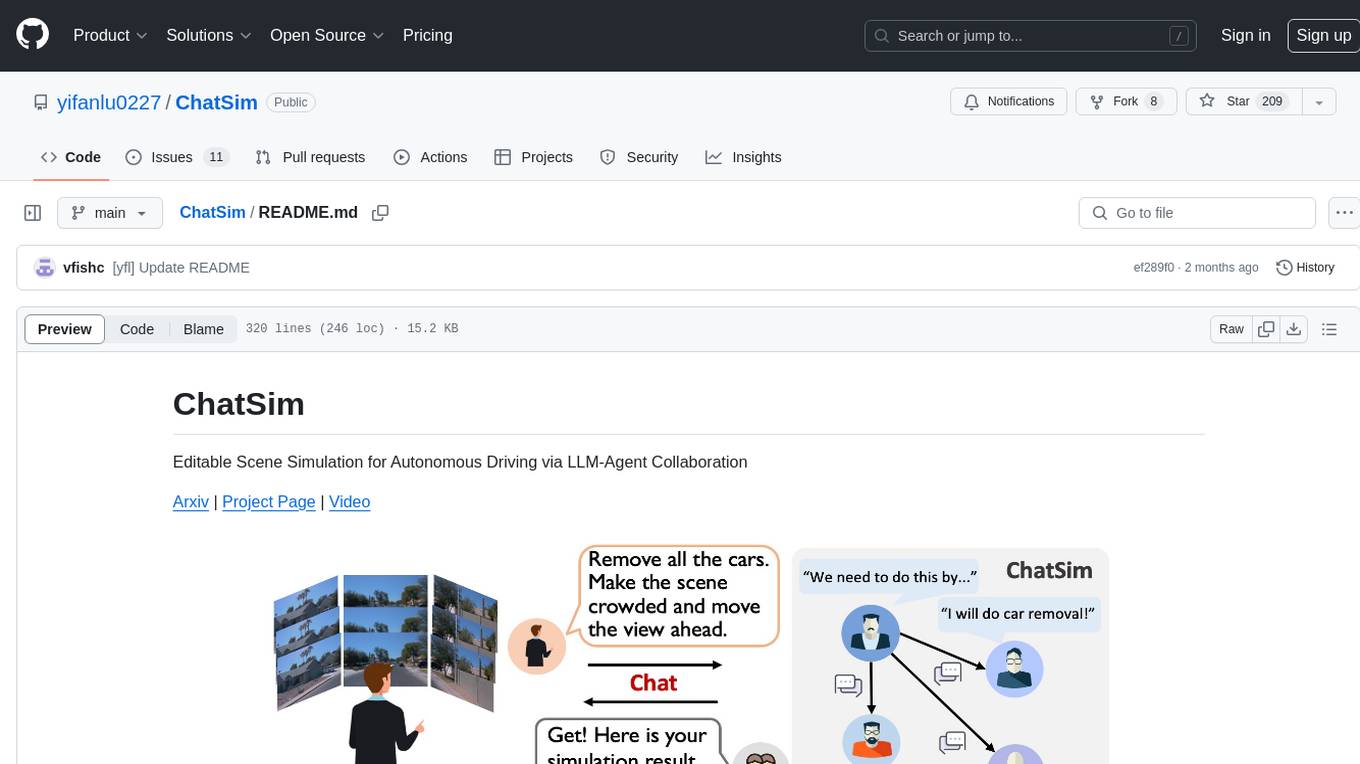
ChatSim
ChatSim is a tool designed for editable scene simulation for autonomous driving via LLM-Agent collaboration. It provides functionalities for setting up the environment, installing necessary dependencies like McNeRF and Inpainting tools, and preparing data for simulation. Users can train models, simulate scenes, and track trajectories for smoother and more realistic results. The tool integrates with Blender software and offers options for training McNeRF models and McLight's skydome estimation network. It also includes a trajectory tracking module for improved trajectory tracking. ChatSim aims to facilitate the simulation of autonomous driving scenarios with collaborative LLM-Agents.
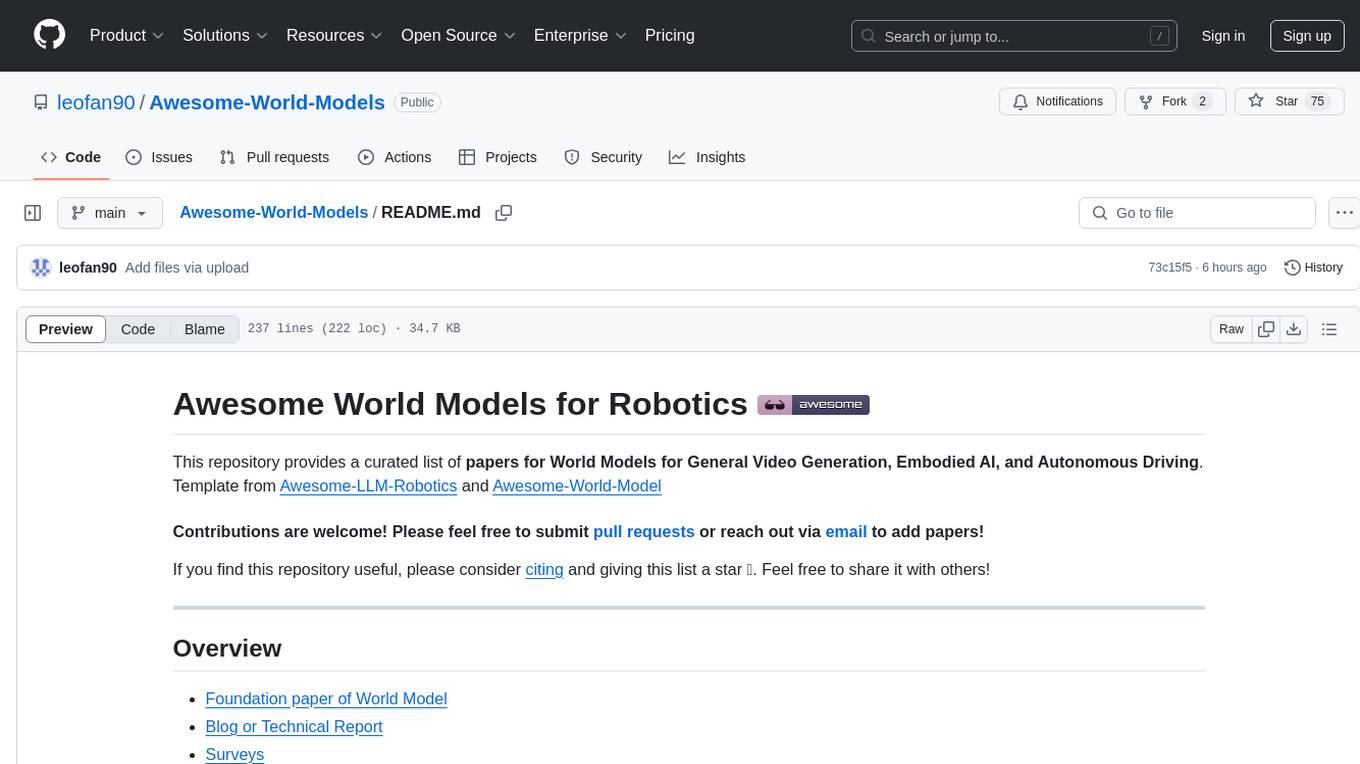
Awesome-World-Models
This repository is a curated list of papers related to World Models for General Video Generation, Embodied AI, and Autonomous Driving. It includes foundation papers, blog posts, technical reports, surveys, benchmarks, and specific world models for different applications. The repository serves as a valuable resource for researchers and practitioners interested in world models and their applications in robotics and AI.

spear
SPEAR (Simulator for Photorealistic Embodied AI Research) is a powerful tool for training embodied agents. It features 300 unique virtual indoor environments with 2,566 unique rooms and 17,234 unique objects that can be manipulated individually. Each environment is designed by a professional artist and features detailed geometry, photorealistic materials, and a unique floor plan and object layout. SPEAR is implemented as Unreal Engine assets and provides an OpenAI Gym interface for interacting with the environments via Python.

openvino
OpenVINO™ is an open-source toolkit for optimizing and deploying AI inference. It provides a common API to deliver inference solutions on various platforms, including CPU, GPU, NPU, and heterogeneous devices. OpenVINO™ supports pre-trained models from Open Model Zoo and popular frameworks like TensorFlow, PyTorch, and ONNX. Key components of OpenVINO™ include the OpenVINO™ Runtime, plugins for different hardware devices, frontends for reading models from native framework formats, and the OpenVINO Model Converter (OVC) for adjusting models for optimal execution on target devices.
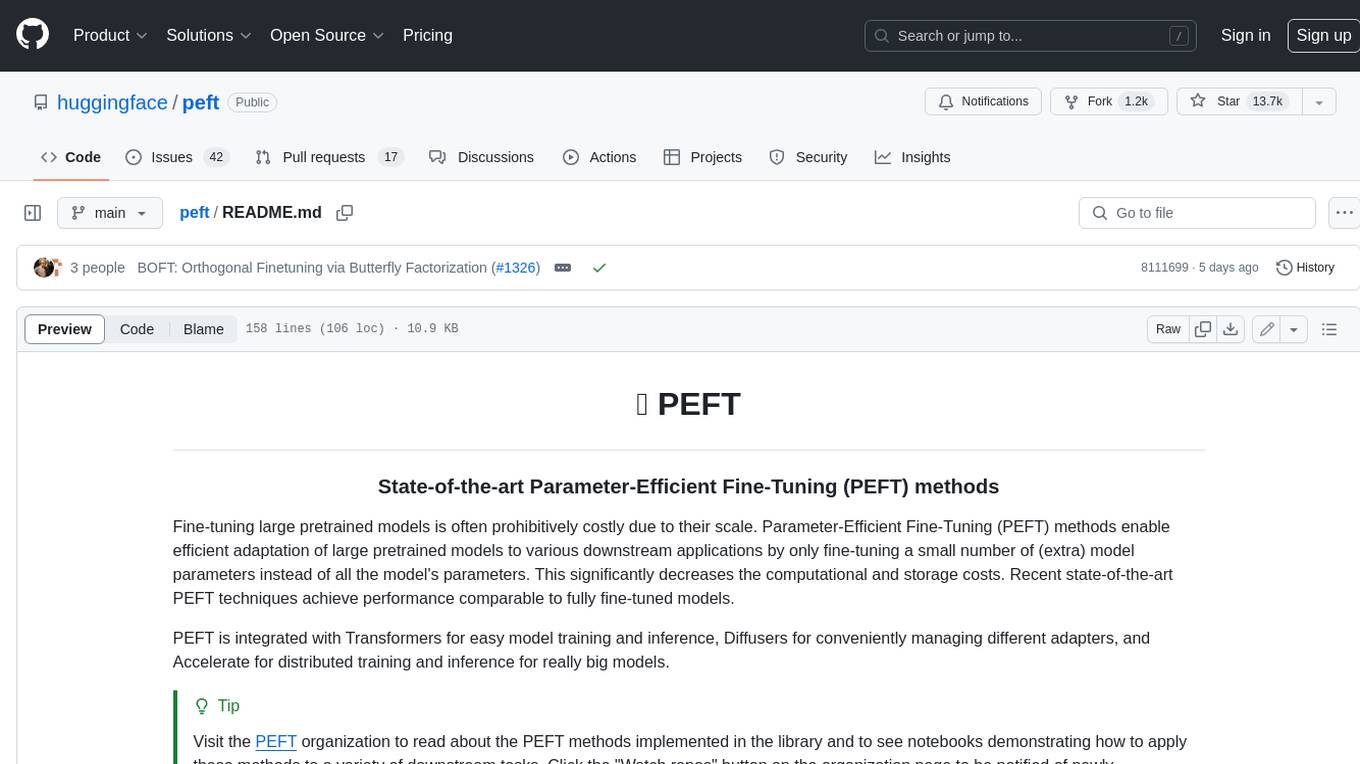
peft
PEFT (Parameter-Efficient Fine-Tuning) is a collection of state-of-the-art methods that enable efficient adaptation of large pretrained models to various downstream applications. By only fine-tuning a small number of extra model parameters instead of all the model's parameters, PEFT significantly decreases the computational and storage costs while achieving performance comparable to fully fine-tuned models.
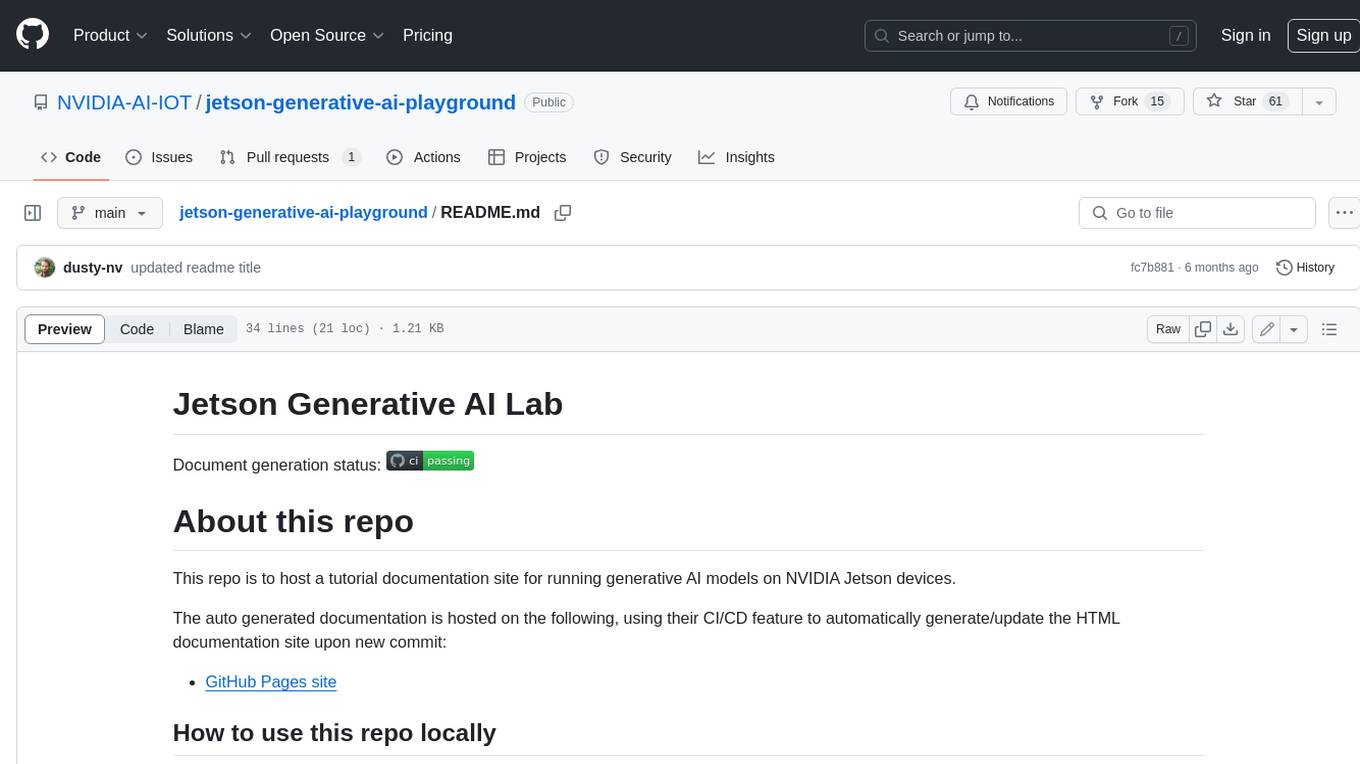
jetson-generative-ai-playground
This repo hosts tutorial documentation for running generative AI models on NVIDIA Jetson devices. The documentation is auto-generated and hosted on GitHub Pages using their CI/CD feature to automatically generate/update the HTML documentation site upon new commits.
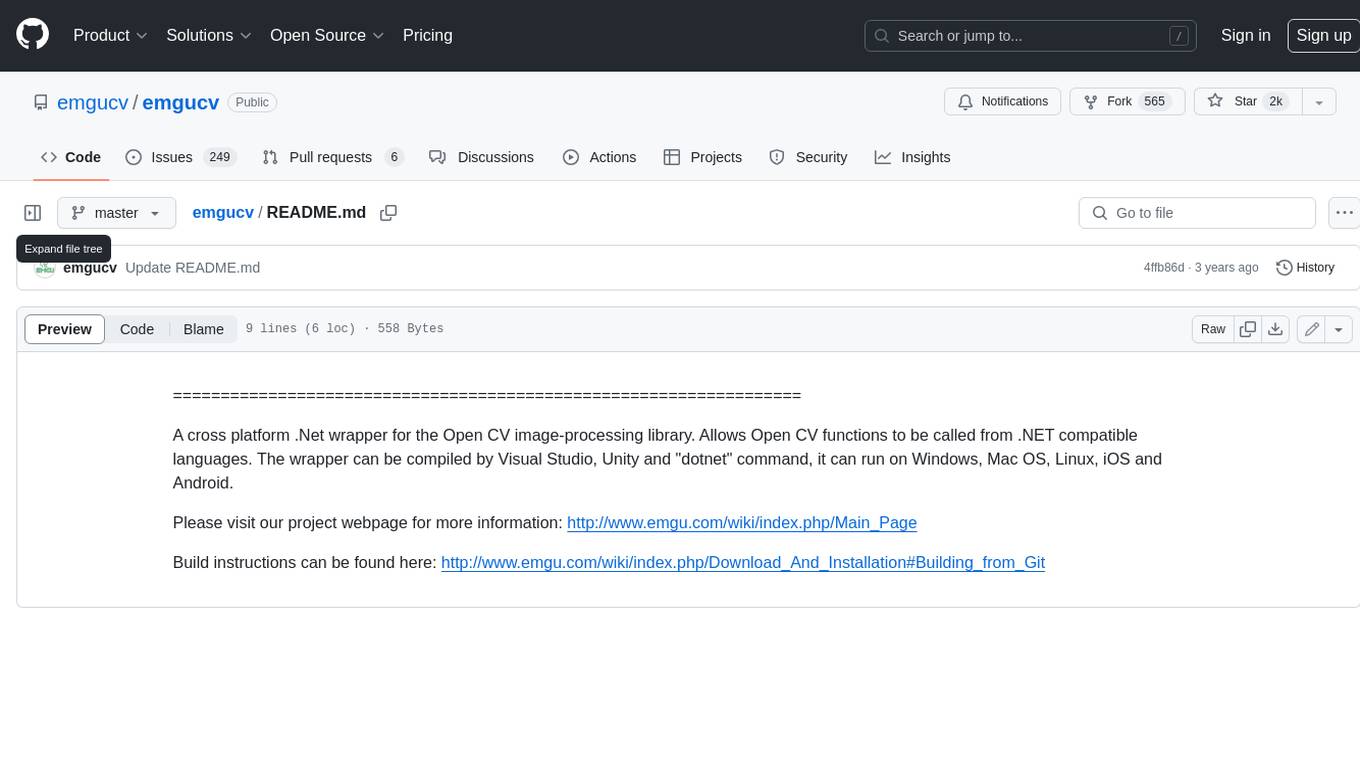
emgucv
Emgu CV is a cross-platform .Net wrapper for the OpenCV image-processing library. It allows OpenCV functions to be called from .NET compatible languages. The wrapper can be compiled by Visual Studio, Unity, and "dotnet" command, and it can run on Windows, Mac OS, Linux, iOS, and Android.





